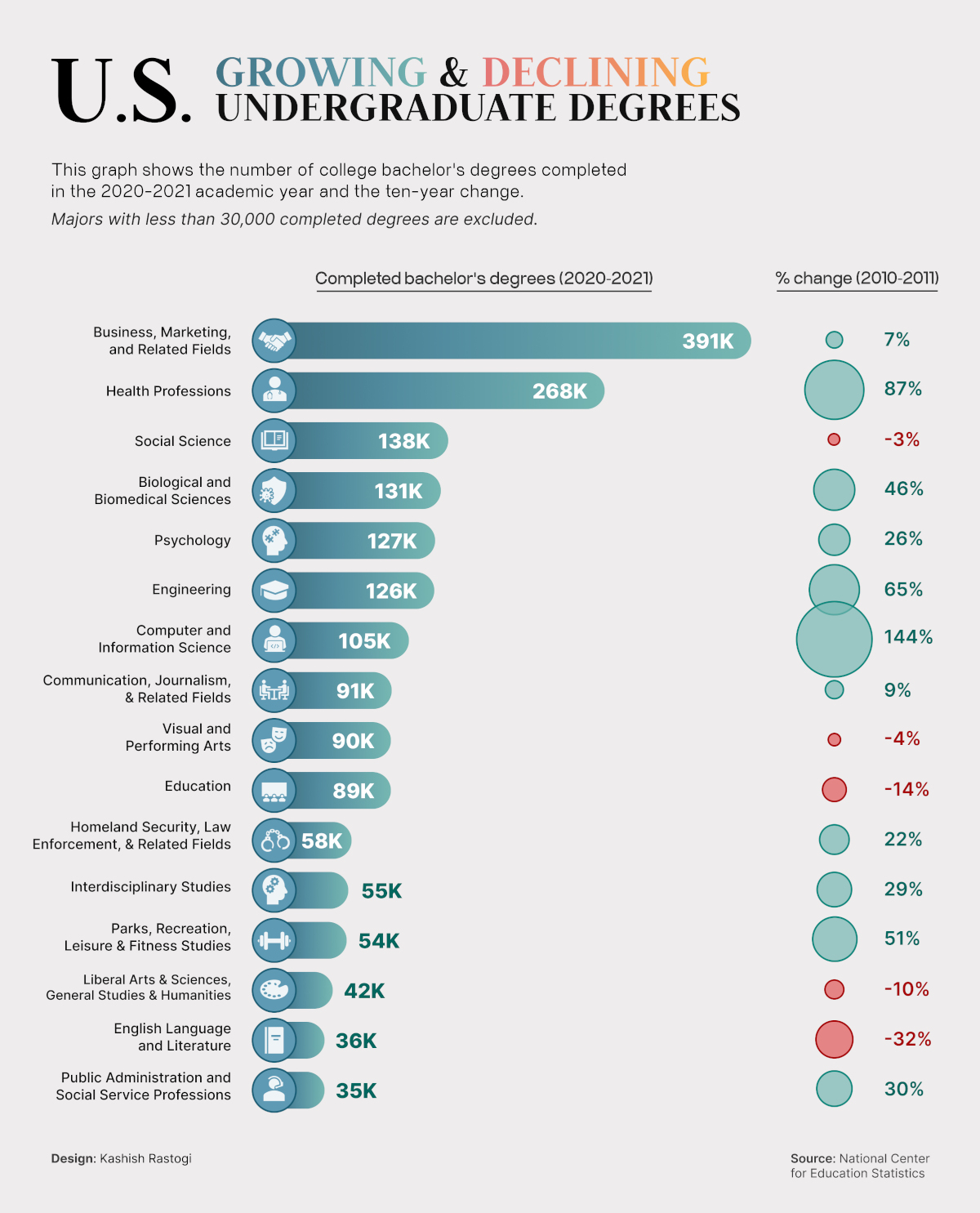The Dark Side of Higher Education: Understanding the Value of a Degree
The rising costs of higher education have led to increased scrutiny on the value of certain degrees. As students and families invest significant time and money in pursuing a degree, it’s essential to consider the potential return on investment. The concept of “useless” degrees has become a topic of discussion, with some fields facing declining job prospects and stagnant salary growth. When choosing a major, it’s crucial to consider the job market and career prospects to ensure that the degree will lead to a fulfilling and financially stable career.
According to the National Center for Education Statistics, the number of students enrolling in higher education has increased significantly over the past few decades. However, this growth has not been matched by a corresponding increase in job opportunities. As a result, many graduates are facing significant challenges in finding employment in their chosen field. This has led to a growing concern about the value of certain degrees and whether they are worth the investment.
Some of the most notable examples of degrees that may not be worth the investment include those in the humanities, social sciences, and fine arts. While these fields can provide a rich and rewarding educational experience, they often lead to limited job prospects and low salary potential. For instance, a degree in journalism may lead to a career with limited job security and low pay, making it challenging for graduates to repay their student loans.
In contrast, degrees in STEM fields (science, technology, engineering, and mathematics) tend to have stronger job prospects and higher salary potential. These fields are often in high demand, and graduates can expect to earn higher salaries and have greater job security. However, even in these fields, there are concerns about the impact of automation and artificial intelligence on job prospects.
Ultimately, the value of a degree depends on various factors, including the job market, career prospects, and personal interests. As students and families consider investing in higher education, it’s essential to weigh the potential benefits and drawbacks of each degree. By doing so, they can make an informed decision that will lead to a fulfilling and financially stable career.
How to Avoid a Degree That Leads to Unemployment
When choosing a degree, it’s essential to consider the job market and career prospects to avoid ending up with a degree that leads to unemployment. One of the most effective ways to do this is to research the job market demand for your desired field. Look for industries that are growing and have a high demand for skilled workers. This will increase your chances of finding employment after graduation.
Another crucial factor to consider is salary potential. Certain degrees, such as those in STEM fields, tend to have higher salary potential than others. However, it’s essential to note that salary potential can vary widely depending on factors such as location, industry, and level of experience. Researching the average salary range for your desired field can help you make an informed decision.
Growth opportunities are also an essential factor to consider when choosing a degree. Look for fields that have a high potential for growth and advancement. This can include industries that are rapidly evolving, such as technology and healthcare. By choosing a degree that has strong growth opportunities, you can increase your chances of career advancement and higher salary potential.
Some of the most in-demand degrees include those in computer science, engineering, and data science. These fields have a high demand for skilled workers and tend to have strong job prospects and salary potential. However, it’s essential to note that other factors, such as personal interest and job satisfaction, should also be considered when choosing a degree.
In addition to researching the job market and salary potential, it’s also essential to consider the skills and qualifications required for your desired field. Look for degrees that provide training in skills that are in high demand, such as programming, data analysis, and digital marketing. By acquiring these skills, you can increase your chances of finding employment and advancing in your career.
Ultimately, choosing a degree that has strong job prospects and career advancement opportunities requires careful research and consideration. By taking the time to research the job market, salary potential, and growth opportunities, you can make an informed decision that will set you up for success in your career.
The Most Over-Saturated Fields: Degrees That Are No Longer in Demand
Several fields that were once in high demand have become oversaturated, leading to a surplus of graduates and a shortage of job opportunities. Journalism, fine arts, and humanities are just a few examples of degrees that have seen a significant decline in job prospects. The rise of digital media has led to a decline in traditional journalism, while the fine arts and humanities have struggled to adapt to the changing job market.
The oversaturation of these fields can be attributed to a combination of factors, including changes in technology and industry trends. The rise of online media has led to a decline in traditional journalism, while the fine arts and humanities have struggled to adapt to the changing job market. Additionally, the increasing accessibility of higher education has led to a surge in graduates, further exacerbating the oversaturation of these fields.
For example, the number of journalism graduates has increased significantly over the past decade, while the number of job opportunities in the field has declined. This has led to a surplus of qualified candidates competing for a limited number of positions, making it increasingly difficult for graduates to find employment. Similarly, the fine arts and humanities have seen a decline in job prospects, as many graduates struggle to find employment in their chosen field.
The oversaturation of these fields has significant implications for students and graduates. It highlights the importance of considering the job market and career prospects when choosing a major. Students who are considering pursuing a degree in one of these fields should carefully research the job market and consider alternative fields that may offer better job prospects.
Furthermore, the oversaturation of these fields also highlights the need for universities and colleges to adapt to the changing job market. Institutions of higher education should prioritize providing students with the skills and training needed to succeed in the modern job market, rather than simply churning out graduates in oversaturated fields.
Ultimately, the oversaturation of certain fields serves as a reminder of the importance of careful planning and research when choosing a major. By considering the job market and career prospects, students can make informed decisions that will set them up for success in their chosen field.
The Rise of Automation: Degrees That Are at Risk of Being Replaced
The increasing use of automation and artificial intelligence in various industries has led to a growing concern about the future of certain jobs and degrees. As machines and computers become more advanced, they are able to perform tasks that were previously done by humans, making some degrees at risk of being replaced.
One of the most notable examples of degrees that are at risk of being replaced is data entry. With the rise of automation, data entry tasks can now be performed by machines, making data entry clerks redundant. Similarly, bookkeeping and accounting tasks are also being automated, making degrees in these fields less valuable.
Manufacturing is another industry that has been heavily impacted by automation. With the use of robots and machines, many manufacturing tasks can now be performed without human intervention, making degrees in manufacturing less relevant.
However, it’s not all doom and gloom. While automation may replace some jobs, it also creates new ones. For example, the rise of automation has created a demand for professionals who can design, implement, and maintain automated systems. This means that degrees in fields such as computer science, engineering, and robotics may become more valuable in the future.
It’s also worth noting that while automation may replace some jobs, it’s unlikely to replace the need for human skills such as creativity, problem-solving, and critical thinking. Degrees that focus on developing these skills, such as those in the humanities and social sciences, may still be valuable in the future.
Ultimately, the rise of automation highlights the importance of choosing a degree that is adaptable to the changing job market. By considering the potential impact of automation on your chosen field, you can make an informed decision about your degree and set yourself up for success in the future.
The Importance of Transferable Skills: How to Make Your Degree More Valuable
In today’s fast-paced and ever-changing job market, having a degree is no longer enough to guarantee success. Employers are looking for candidates who possess a range of transferable skills that can be applied to various industries and careers. Transferable skills are skills that can be used in multiple contexts and are highly valued by employers.
Some of the most important transferable skills include communication, problem-solving, and critical thinking. These skills are essential for success in any career and can be applied to a wide range of industries. For example, a degree in English may not seem directly applicable to a career in business, but the communication and writing skills learned through the degree can be highly valuable in a business setting.
Another important transferable skill is teamwork and collaboration. Many employers value candidates who can work effectively in a team and collaborate with others to achieve a common goal. This skill can be developed through group projects and teamwork exercises in college, and can be applied to a wide range of careers.
Time management and organization are also essential transferable skills. Employers value candidates who can prioritize tasks, manage their time effectively, and meet deadlines. These skills can be developed through coursework and extracurricular activities in college, and can be applied to a wide range of careers.
In addition to these skills, adaptability and flexibility are also highly valued by employers. The ability to adapt to new situations and technologies is essential in today’s fast-paced job market. This skill can be developed through coursework and extracurricular activities in college, and can be applied to a wide range of careers.
By developing these transferable skills, you can increase the value of your degree and make yourself a more attractive candidate to potential employers. Remember, it’s not just about the degree itself, but about the skills and knowledge you gain through the process of earning it.
Alternative Paths to Success: How to Succeed Without a Traditional Degree
While a traditional degree can provide a solid foundation for a career, it’s not the only path to success. Many individuals have achieved their goals and found success through alternative routes, such as online courses, vocational training, and entrepreneurship.
Online courses, for example, offer a flexible and affordable way to learn new skills and gain knowledge in a specific area. Platforms like Coursera, Udemy, and edX provide access to a wide range of courses and degree programs from top universities and institutions. This can be a great option for those who want to learn at their own pace or who may not have the time or resources to pursue a traditional degree.
Vocational training is another alternative path to success. Vocational training programs focus on teaching specific skills and trades, such as plumbing, electrical work, or culinary arts. These programs can provide individuals with the skills and knowledge needed to enter the workforce immediately and start earning a living.
Entrepreneurship is also a viable alternative to a traditional degree. Many successful entrepreneurs have achieved their goals without a degree, instead relying on their passion, hard work, and determination to build a successful business. With the rise of the gig economy and online platforms, it’s easier than ever to start a business and turn a passion into a career.
Examples of successful individuals who have achieved their goals without a traditional degree include Steve Jobs, who dropped out of college to pursue his passion for technology, and Richard Branson, who never attended college but went on to build a business empire. These individuals, and many others like them, demonstrate that success is not solely dependent on a traditional degree.
Ultimately, the key to success is not the path you take, but the skills and knowledge you gain along the way. By considering alternative paths to success, individuals can find a route that works best for them and their goals, and achieve success on their own terms.
The Role of Personal Interest: How to Choose a Degree That Aligns with Your Passions
When choosing a degree, it’s essential to consider your personal interests and passions. Pursuing a degree that aligns with your interests can lead to greater job satisfaction and career fulfillment. When you’re passionate about your work, you’re more likely to be motivated and engaged, which can lead to greater success and happiness.
One way to determine if a degree aligns with your interests is to reflect on your hobbies and activities outside of school. What do you enjoy doing in your free time? What subjects do you find most fascinating? These can be clues to what degree might be the best fit for you.
Another way to explore your interests is to research different careers and job descriptions. Look into the day-to-day responsibilities of various jobs and see if they align with your passions and interests. You can also talk to professionals in your desired field to gain insight into what their job entails and what skills and knowledge are required.
It’s also important to consider the values and goals that are most important to you. What kind of work environment do you thrive in? What kind of impact do you want to make in your career? When you choose a degree that aligns with your values and goals, you’re more likely to find fulfillment and satisfaction in your career.
Ultimately, choosing a degree that aligns with your personal interests and passions is crucial to finding success and happiness in your career. By taking the time to reflect on your interests and values, you can make an informed decision that sets you up for long-term success.
Conclusion: Making an Informed Decision About Your Degree
In conclusion, choosing a degree is a critical decision that can have a significant impact on your future career prospects and overall well-being. With the rising costs of higher education and the increasing scrutiny on the value of certain degrees, it’s essential to make an informed decision that takes into account multiple factors, including job prospects, salary potential, and personal interest.
By considering the job market demand, salary potential, and growth opportunities of a degree, you can make a more informed decision that sets you up for success. Additionally, developing transferable skills, such as communication, problem-solving, and critical thinking, can increase the value of your degree and make you a more attractive candidate to potential employers.
It’s also important to consider alternative paths to success, such as online courses, vocational training, and entrepreneurship. These options can provide a more affordable and flexible way to gain the skills and knowledge needed to succeed in your chosen field.
Ultimately, the key to making an informed decision about your degree is to do your research and consider multiple factors. By taking the time to explore your options and weigh the pros and cons of different degrees, you can make a decision that aligns with your goals and sets you up for long-term success.
Remember, a degree is not a guarantee of success, but it can certainly provide a foundation for a successful career. By making an informed decision and considering multiple factors, you can set yourself up for success and achieve your goals.







